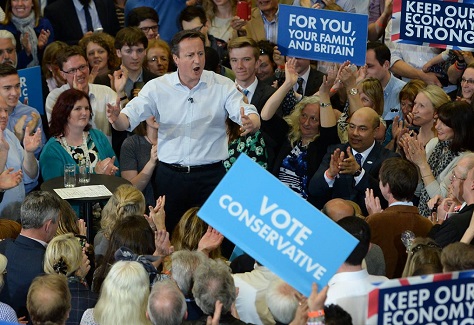It’s morning in the United Kingdom, and the BBC is projecting that the Conservative Party will win 325 seats — exactly half of the House of Commons, and an increase of 20 seats from the 305 seats that the Tories held in the prior parliament.![]()
What’s clear is that prime minister David Cameron will keep his job, and all the talk of a hung parliament and weeks of coalition-building seems to have been wrong.
But what will Cameron face in the next five years?
Here are the seven things to watch, as the second Cameron government unfolds:
- Managing new allies. Though the Tories will win the smallest of majorities, according to current projections, it may well want a margin of error. That means it will need to reach out to its former coalition partner, the Liberal Democrats, which have been decimated from 56 seats to around 12. It also may mean reaching out to the Democratic Union Party (DUP) or the Ulster Unionist Party (UUP), both from Northern Ireland, which will hold 10 seats together.
- EU renegotiation and referendum. As promised, Cameron seems determined to keep his pledge to hold an ‘in/out’ referendum on the United Kingdom’s membership in the European Union in 2017. First, however, he’ll have to wrangle some face-saving concessions to Great Britain from his EU partners, upon which he can be expected to use to support British membership, alongside Labour, the Lib Dems and even the pro-independence Scottish National Party (SNP), along with the wide spectrum of British business.
- Burying UKIP. Although the eurosceptic United Kingdom Independence Party (UKIP) will emerge as the party that won the third-largest number of votes nationwide, it will have won just one seat, perhaps two. In the next five years, Cameron has the opportunity to make UKIP irrelevant, especially if Nigel Farage loses his race in South Thanet and stands down as UKIP leader.
- Constitutional reform and Scottish relations. Cameron won election, in part, by scaring English voters that a Labour government propped up by the SNP would amount to a ‘coalition of chaos.’ With the nationalist SNP winning 56 of 59 seats in Scotland, Cameron’s first task is mending ties between England and Scotland. Expect him to make good on promises of further devolution to regional government in Holyrood, but also look for Cameron to try to exclude Scottish MPs from voting on English-only matters in Westminster — or even introducing English devolution. It will take all his political skill to keep from alienating Scottish first minister and SNP leader Nicola Sturgeon, let alone the Scottish voters who will now have exactly one MP representing them in the next government.
- Balancing the budget and growing the economy. Cameron and chancellor George Osborne will have their work cut out for them in reducing a budget deficit that is still 5% of the country’s GDP, all while doubling child care for three- and four-year olds and eliminating income tax for minimum-wage workers. With GDP growth on the rise, Cameron will have to work to keep the British economy expanding and make sure that those gains extend outside London and southern England.
- Maintaining Tory unity as 2017 and 2020 approach. Eurosceptic Tory backbenchers could tear the party apart over Europe — they’ve done it before in the 1990s to prime minister John Major. Expect the 2017 referendum to be deeply divisive within the Conservative Party. In the meanwhile, because Cameron pledgpledged ed in March not to run for a third term, he’ll essentially be a lame duck. The breadth of his surprising victory will keep would-be successors at bay, including London mayor Boris Johnson, who won his constituency of Uxbridge. But like it or not, the race to lead the Conservatives in the post-Cameron era will become a larger distraction as the next term progresses.
- Managing a new American president. Though Cameron has had a great working relationship with US president Barack Obama, he will face a new American leader in 2017. Cameron, therefore, will have to learn how to work with a new personality in managing the ‘special relationship,’ whether it’s former US secretary of state Hillary Clinton, former Florida governor Jeb Bush, Wisconsin governor Scott Walker or another potential candidate. Among the top priorities for Cameron will be the Trans-Atlantic Trade and Investment Partnership (TTIP), the landmark US-EU trade deal that’s taken a backseat to the Trans-Pacific Partnership.

you are brilliant